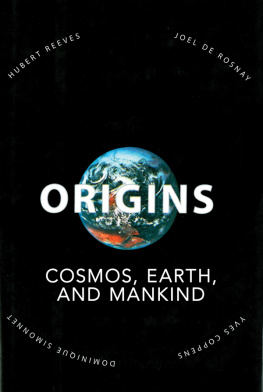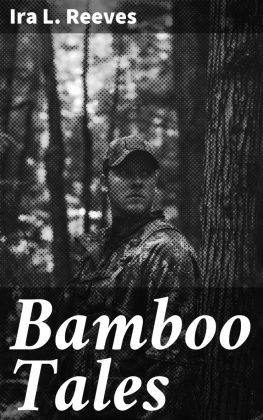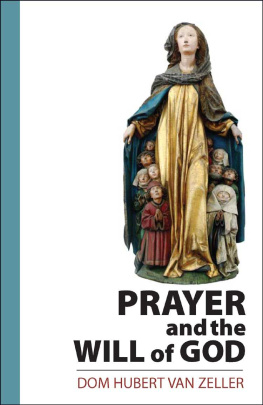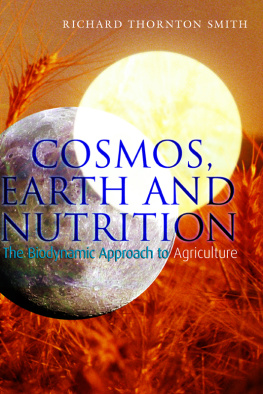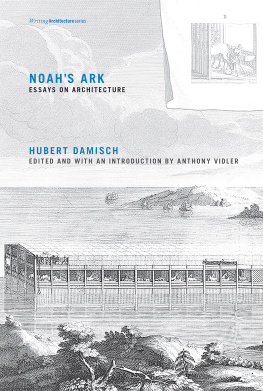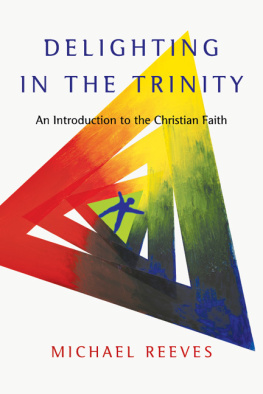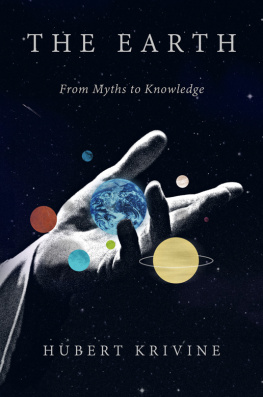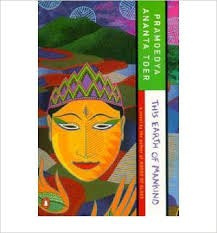Hubert Reeves - Origins: Speculations on the Cosmos, Earth, and Mankind
Here you can read online Hubert Reeves - Origins: Speculations on the Cosmos, Earth, and Mankind full text of the book (entire story) in english for free. Download pdf and epub, get meaning, cover and reviews about this ebook. year: 1998, publisher: Arcade Publishing, genre: Religion. Description of the work, (preface) as well as reviews are available. Best literature library LitArk.com created for fans of good reading and offers a wide selection of genres:
Romance novel
Science fiction
Adventure
Detective
Science
History
Home and family
Prose
Art
Politics
Computer
Non-fiction
Religion
Business
Children
Humor
Choose a favorite category and find really read worthwhile books. Enjoy immersion in the world of imagination, feel the emotions of the characters or learn something new for yourself, make an fascinating discovery.
- Book:Origins: Speculations on the Cosmos, Earth, and Mankind
- Author:
- Publisher:Arcade Publishing
- Genre:
- Year:1998
- Rating:3 / 5
- Favourites:Add to favourites
- Your mark:
- 60
- 1
- 2
- 3
- 4
- 5
Origins: Speculations on the Cosmos, Earth, and Mankind: summary, description and annotation
We offer to read an annotation, description, summary or preface (depends on what the author of the book "Origins: Speculations on the Cosmos, Earth, and Mankind" wrote himself). If you haven't found the necessary information about the book — write in the comments, we will try to find it.
Origins: Speculations on the Cosmos, Earth, and Mankind — read online for free the complete book (whole text) full work
Below is the text of the book, divided by pages. System saving the place of the last page read, allows you to conveniently read the book "Origins: Speculations on the Cosmos, Earth, and Mankind" online for free, without having to search again every time where you left off. Put a bookmark, and you can go to the page where you finished reading at any time.
Font size:
Interval:
Bookmark:



Copyright 1996, 2011 by Editions du Seuil
Translation copyright 1998, 2011 by Arcade Publishing
All Rights Reserved. No part of this book may be reproduced in any manner without the express written consent of the publisher, except in the case of brief excerpts in critical reviews or articles. All inquiries should be addressed to Arcade Publishing, 307 West 36th Street, 11th Floor, New York, NY 10018.
Arcade Publishing books may be purchased in bulk at special discounts for sales promotion, corporate gifts, fund-raising, or educational purposes. Special editions can also be created to specifications. For details, contact the Special Sales Department, Arcade Publishing, 307 West 36th Street, 11th Floor, New York, NY 10018 or .
Arcade Publishing is a registered trademark of Skyhorse Publishing, Inc., a Delaware corporation.
First published in France under the title La plus belle histoire du monde
Visit our website at www.arcadepub.com.
10 9 8 7 6 5 4 3 2 1
Library of Congress Cataloging-in-Publication Data is available on file
ISBN: 978-1-61145-507-6
Imagine a crisp, clear winter night in the countryside. I see the breathtaking vista of tens of thousands of stars, points of light glittering in the blackness. So many brilliant stars are visible that I can barely discern the constellations. I lie on my back and imagine that I am instantaneously transported far back in time. Would I see the same display of shining points of light? Or would it be even more spectacular? Would the stars shine even more brilliantly?
In my imagination, I view the stars not as I see them in the sky but as they were millions, even billions, of years ago. I can reach back to the beginnings of man and beyond, to the creation of the Earth and even of the Milky Way itself. Then the stars shone more intensely. The stars were youthful, vigorous, even brighter than those I see in the sky. And they were more crowded together, for space has been relendessly flying apart as the universe expands.
But my imagination knows no bounds. Let me go back even further. What was there even earlier, before stars were born? The glory of the stars is a transient thing. Stars are born, shine brilliantly, exhaust their inner energy supply, and die. This we know, for we view the life and death of stars around us. But what, if anything, preceded the stars? What were the first objects in the universe? And what came next? Once stars were born, how did the conditions arise that led to the formation of planets, and ultimately of life? How did life evolve? Why did life evolve? Did life evolve painstakingly slowly over untold eons, or did life emerge in a sudden proliferation of species triggered by some cosmic event?
These are some of the issues that are discussed in this wonderful book. The interfaces of astronomy, physics, chemistry, paleontology, and anthropology, all crucial disciplines for probing the primordial fog, are explored in a series of penetrating responses to the queries of a leading science editor. So relax and enjoy this approach to some of the most fascinating topics imaginable.
Joseph Silk
Professor of Physics and Astronomy
University of California, Berkeley

Where do we come from? What are we? Where are we going? These are indeed the only questions worth asking. Each of us in our own way has sought the answer when we gaze upon a twinkling star, contemplate the incessant movement of the ocean tides, capture a womans passing glance or the smile of a newborn babe.... Why are we alive? Why does the world exist? Why are we here?
Until recently, only religion, faith, belief have offered answers, provided a meaning. Today science, too, has come up with an opinion. That is doubtless one of the great accomplishments of our waning century: at long last we have a complete record of our origins. Science has managed to reconstitute the history of the world.
What, in fact, has science discovered that is so extraordinary? It has been able to determine that the same adventure has been going on for some fifteen billion years, an adventure that brings together the universe, life, and humankind, as if they were three chapters of one long epoch. The thrust of that same evolution, from the Big Bang to the emergence of intelligent life, has been a constant movement from the simple to the increasingly complex: the first particles, the atoms, the molecules, the stars, the cells, the organisms of living beings, until we arrive at the curious creatures we call human.... All stages follow one another in one continuous chain, all are swept along by the same movement. We descend from monkeys and bacteria, but also from the stars and the galaxies. The same elements of which our bodies are composed are those that, billions of years ago, brought the universe into being.
The idea is obviously upsetting, for it calls into question a number of ancient, long-held beliefs, as it strips away all sorts of prejudices. Since antiquity, the progress of knowledge has constantly taken man down a peg or two, put him in his rightful place. We thought we were at the center of the universe? Galileo, Copernicus, and others came along to disabuse us: actually, it turned out, we dwelled on a very ordinary planet on the outskirts of a relatively modest galaxy. We thought we were the products of original creation, quite apart from all other living species? Think again! Darwin set us firmly on the genealogical tree of animal evolution. Once again we were forced to swallow our misplaced pride and recognize that we are but the latest products of universal organization.
What this book intends is to describe, in easily understandable terms, this new history of the universe and the world (by which we mean the Earth), relying on the latest scientific knowledge. What we will discover as we go on in this tale is a surprising coherence. We shall see that the elements of matter will combine into ever more complex structures, which in turn will combine into more elaborate combinations, which in turn... This is the same phenomenon, the phenomenon of natural selection, that orchestrates each movement of this grand score, be it the organization of matter in the universe, the game of life on Earth, or even the formation of neurons in our human brains, as if there were a kind of logic to evolution.
Where does God fit into all this? A certain number of scientific discoveries conjoin with or reinforce intimate convictions. To be sure, we make every effort in the following pages not to mix science and religion, each of which reigns over separate domains. Science learns; religion teaches. Doubt is the motivating force behind the former, faith the glue that holds together the latter. Still, neither science nor religion is indifferent to the other. Our new history of the world makes no attempt to skirt, or avoid, either spiritual or metaphysical questions. Along our scientific journey we will perceive, at one point, a ray of biblical light, at another hear the echo of some ancient myth, and even, in the far distant African savanna, catch a glimpse of Adam and Eve. The latest discoveries, far from ending once and for all the debates between science and religion, bring them up to date, lend them new life and meaning. One can choose and conclude whatever one will.
Font size:
Interval:
Bookmark:
Similar books «Origins: Speculations on the Cosmos, Earth, and Mankind»
Look at similar books to Origins: Speculations on the Cosmos, Earth, and Mankind. We have selected literature similar in name and meaning in the hope of providing readers with more options to find new, interesting, not yet read works.
Discussion, reviews of the book Origins: Speculations on the Cosmos, Earth, and Mankind and just readers' own opinions. Leave your comments, write what you think about the work, its meaning or the main characters. Specify what exactly you liked and what you didn't like, and why you think so.

